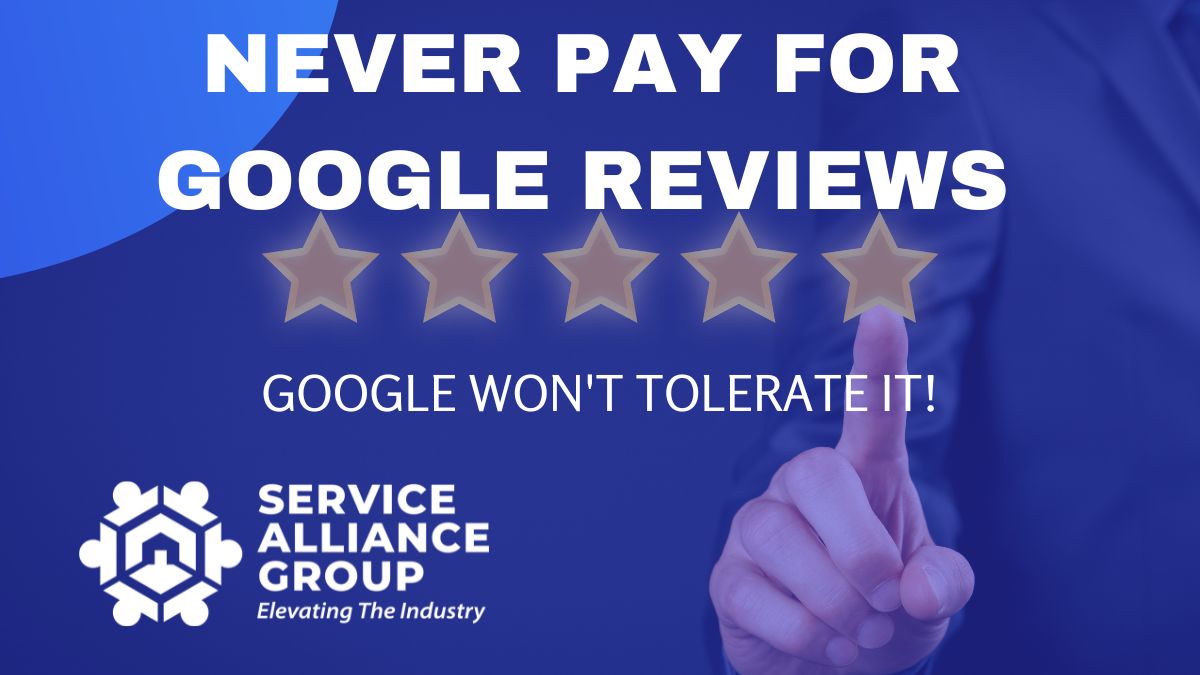Google, the world’s largest search engine, recently initiated a lawsuit against a lead generation company for deceptive practices that violate Google’s guidelines and policies when creating Google business listings and fake Google reviews. The company was accused of using false identities to post reviews and offering incentives to customers in exchange for positive reviews. This is just the latest example of why it’s important to avoid paying for Google reviews, as doing so can not only put your business at risk of legal action from Google but may also lead to a decrease in customer trust and loyalty.
Google Sues Los Angeles Lead Gen Company
Google is taking a stand against fake business profiles and reviews by filing a lawsuit against a company allegedly engaging in such deceptive practices. The tech giant’s decision to sue the company is an attempt to “put an end to these types of malicious schemes” and protect consumers and business owners relying on Google’s industry-leading business listing services.
According to court documents, the company created 350 fraudulent Business Profiles and over 14,000 fake reviews to manipulate Google’s local search results. Google detected and removed this deceptive content but is now taking proactive legal action to prevent this bad actor from scamming other platforms and to safeguard its users.
The court filing names “Ethan QiQi Hu; GMBEye; Rafadigital, LLC (“Rafadigital”); and Does 1–20” as defendants and outlines the defendants’ “complex and misleading scheme to deceive consumers, business owners, and Google” through the unlawful manipulation of Google’s business listing services. The suit also claims the company attempted to sell information about consumers lured in through false claims (commonly known as leads).
While it is unclear how much the lawsuit is for, Google’s move to take legal action against businesses engaging in such practices underscores its commitment to keeping its business listings pure. By cracking down on fake reviews and profiles, Google is sending a message that it will not tolerate deceptive practices that could harm businesses and consumers.
What Did They Do Wrong
The lawsuit by Google against a lead generation company revolves around three major fraudulent schemes, all aiming to manipulate Google’s Business Profile tools and verification services for illegal financial gain.
Fraudulent Business Profile Verification Scheme: The defendants reportedly created over 350 fake Business Profiles since mid-2021. They designed fake websites, assigned VoIP phone numbers with appropriate area codes, and impersonated fake business owners to trick Google into verifying their false listings. Using carefully prepared props during video calls with Google, they made their fake businesses appear real. Once the fake Business Profiles were verified, they would modify the profiles to make them more appealing to potential buyers or update them with unverified real-world business information before selling or transferring them. Some examples included transforming a fake reiki provider into a plumbing business, a fake housekeeping service into a garage repair business, and a non-existent spa into a painting business.
Fraudulent Business Profile Review Scheme: To make their fake listings seem legitimate and credible, the defendants allegedly orchestrated the posting of fake reviews on these fraudulent Business Profiles. Google detected connections between the defendants and over 350 fraudulent Business Profiles, involving at least 14,000 fake reviews, most of which were awarded five out of five stars. Most of these reviews were posted by two actors in Bangladesh and Vietnam. It’s suspected that the defendants hired these or other unknown persons to post these fake reviews to increase the appeal of their fraudulent listings. They also offered to arrange for third parties to post fake positive reviews of their client’s real businesses for a fee.
Fraudulent Business Profile Lead Generation Scheme: The defendants used these profiles to lure unsuspecting consumers while waiting to sell or transfer their fake Business Profiles. Upon searching for services on Google Search or Maps, these consumers would come across these fake profiles and, relying on the false reviews, contact these businesses. The defendants then sold this information as “leads” to businesses providing the services the consumers sought. The consumers believed they were contacting a specific business based on its Google profile but were redirected to a different business instead. This misleading behavior likely eroded consumer trust in Google’s Business Profiles. The defendants openly offered these “lead generation” services and solicited businesses through channels like Facebook.
How Did They Get Caught
The details provided do not explicitly indicate how the defendants were caught. However, given Google’s robust infrastructure and analytics capabilities, it’s reasonable to infer that Google likely identified the fraudulent activity through internal mechanisms and data analytics.
Unusual Patterns and Anomalies: Google might have detected unusual patterns associated with the Business Profiles in question. The sudden creation of numerous business profiles, frequent changes in business details, or repeated use of the same set of props, templates, or VoIP numbers could have raised flags. Similarly, patterns in the reviews, such as all being five-star ratings or originating from unusual locations relative to the businesses, could have signaled potential fraud.
IP and Location Tracking: Given that the fake reviews were posted from Bangladesh and Vietnam. At the same time, the businesses were supposedly US-based; Google could have identified inconsistencies in IP addresses and geographic locations.
Machine Learning and AI: Google uses advanced AI and machine learning algorithms to identify fraudulent activity and unusual behavior patterns. These systems could have flagged suspicious activity related to fake business profiles.
In-depth Verification: Some business profiles could have been subject to deeper investigation due to factors like high volumes of activity or reports from users. Upon inspection, Google could have discovered that they were not legitimate.
Public Information and Third-party Reports: Google may also have received tips or complaints from users, real businesses, or external parties who noticed suspicious activity. For example, real businesses falsely represented or users misled by fraudulent profiles could have reported these issues to Google.
Remember, this is speculative based on how similar operations are usually detected. The document provided does not state exactly how the fraudulent activities were uncovered. However, in reviewing the document, it is easily apparent that Google put a lot of effort into building this case, and they were able to correlate many profiles that were directly tied to this lead gen agency.
3 Reasons You Should Never Buy Google Reviews
Buying Google reviews may seem quick and easy to boost a business’s online reputation, but it could harm it in the long run. Here are three main reasons why you should never pay for fake reviews.
Firstly, fake reviews can seriously damage a company’s online reputation. Potential customers rely heavily on online reviews to make decisions, and if they discover that a business has fraudulent reviews, they will likely lose trust in that brand.
Secondly, buying reviews is illegal and can result in legal action. Both the business and the review provider can face penalties for fake reviews. Therefore, avoiding shortcuts and focusing on providing genuine customer experiences is important.
Thirdly, Google algorithms can detect fake reviews and punish businesses by lowering search rankings. This results in lower visibility to potential customers, ultimately decreasing conversion rates.
In today’s digital age, having legitimate reviews is essential for businesses to build trust with their customer base. Therefore, it’s crucial to prioritize genuine customer experiences and avoid taking shortcuts that can ultimately harm a company’s online reputation.
Don’t buy Google reviews — do this instead
Customer reviews are important for businesses trying to build an online reputation. Google reviews are particularly vital, as they greatly impact a company’s visibility on the search engine. However, many businesses are tempted to buy reviews to increase their positive ratings. This is not only illegal but can also harm a business’s reputation. This article will explore why you shouldn’t buy Google reviews and provide better alternatives. By investing in genuine reviews, businesses can grow their customer base, improve conversion rates, and enhance their online reputation.
How to Get More Google Reviews Organically?
As a business owner, you want your online reputation to reflect the quality of service you offer. Genuine customer reviews are critical to this end, and Google reviews are one of the most influential sources of customer feedback.
But how do you get Google reviews organically? One of the most effective ways is to ask your customers for feedback through email or text messages, which allows them to provide reviews at their leisure.
Timing is essential when sending review requests. It’s important to follow up with customers shortly after their experience to get the most accurate feedback, whether it’s positive or negative. This shows that you value their input and are dedicated to providing the best possible service.
Following up on review requests with a personal message is also essential. Expressing appreciation for their time and feedback encourages happy customers to provide more positive reviews, while negative feedback allows you to address and resolve issues.
By implementing these strategies, you can increase your chances of obtaining organic Google reviews and, in turn, increase your search rankings and conversion rates. Remember, genuine reviews from real customers are crucial to showcase the quality of your business and attract new customers.
1. Link to your Google Business Profile.
Link to your Google Business Profile:
https://www.google.com/business/
- Ask customers for feedback in person or via email/text message.
- Follow up with a personal message to thank them for their time and feedback.
- Monitor the reviews regularly and respond to negative feedback promptly.
To ensure your business continues to get more Google reviews, it’s important to maintain a consistent presence on the platform. This means regularly monitoring new and existing reviews and promptly responding to negative feedback. Doing so shows customers that you value their opinions and are willing to address any issues they might have had with your services.
It’s also wise to take advantage of other platforms where
2. Verify your business on Google.
The next step is to verify your business on Google to get more Google reviews. The verification process ensures that you have complete control over your business page and can respond to reviews promptly. This helps build customer trust and improves your local search engine optimization efforts.
Once you have a verified business profile, you can respond to all customer reviews, whether positive, negative, or fake. Responding to reviews shows that you value customer feedback and are committed to providing excellent service. As a result, your happy customers are more likely to leave positive reviews, attracting more potential customers to your business.
Furthermore, having a verified business profile allows you to add business information, including your name, address, and phone number, which helps Google rank your business higher in local search results. This means that when potential customers search for businesses similar to yours, they are more likely to find and choose your business over others.
Overall, verifying your business on Google is essential to getting more Google reviews, building customer trust, and improving your local SEO efforts.
3. Honor all honest reviews.
As a business owner, you must honor all honest reviews on your Google Business Profile. This means responding to both positive and negative feedback in a timely and personalized manner. When you receive positive reviews, show appreciation and acknowledgment for the customer’s feedback. This helps build a relationship with your customer base and encourages them to leave more positive reviews in the future.
For negative reviews, it’s important to address concerns professionally and respectfully. Use the customer’s name when responding, and try to respond as quickly as possible. Avoid being confrontational or defensive; instead, offer a solution or explanation for the issue raised in the review. This shows that you take feedback seriously and are committed to improving the customer experience.
Remember, all feedback is valuable and can help inform future business decisions. Honoring honest reviews can build a stronger relationship with your customer base and improve your overall business reputation.
4. Engage with reviews (both positive and negative).
Engaging with customer reviews can greatly benefit your business and improve your online reputation. When responding to positive reviews, it’s important to thank the reviewer for their feedback and show appreciation for their business. This helps build loyal customers and can encourage others to leave positive reviews.
On the other hand, negative reviews can sometimes be challenging to handle. However, it’s important to respond to negative reviews professionally and respectfully. Acknowledge the customer’s concerns and offer a solution or explanation for the issue raised in the review. Always address the customer by name and avoid being confrontational or defensive.
One key approach is to offer help and address their issue directly. Doing so shows that you take feedback seriously and are committed to improving the customer experience. This helps to build trust with customers and can even turn a negative experience into a positive one.
In summary, engaging with customer reviews can benefit your business immensely by building customer loyalty and improving your online reputation. Remember to always respond to positive or negative reviews with gratitude and a willingness to help.
5. Provide a great customer experience.
To ensure positive Google reviews, providing a great customer experience is crucial. Customers are more likely to write reviews if they have had a memorable experience with a business. This highlights the importance of providing high-quality customer service and exceeding client expectations.
While incentivizing customers to leave reviews may seem like a good idea, businesses must ensure that the reviewer can write about their experience honestly. Offering something in exchange for reviews is acceptable if it does not influence the reviewer’s opinion or prevent them from sharing their true experience.
Positive Google reviews benefit a business’s online reputation, search rankings, and conversion rates. Authentic reviews from legitimate customers can improve a business’s visibility on search engines and attract potential customers. Therefore, businesses should prioritize a review process that allows a genuine customer experience to be shared.
It is also important to have clear review policies and processes and use review management software to respond to and promptly address customer feedback. Providing great customer experiences, incentivizing reviews the right way, and allowing customers the freedom to write honest reviews will help businesses build a strong online reputation and customer base.
Let Your Service Speak For Itself
Providing the best customer experience possible should be a top priority as a business owner. This can be achieved through offering high-quality products or services that meet the needs and expectations of your customers.
When building an online reputation, it may be tempting to buy positive Google reviews to improve your brand’s image. However, this practice is unethical and can have severe consequences, including legal action and a damaged reputation.
Instead, focus on gaining organic reviews through customer satisfaction. Encourage your customers to leave reviews after experiencing your product or service and ensure that they feel valued. You will naturally attract positive customer feedback by prioritizing customer satisfaction and providing quality service.
Letting your service speak for itself can improve your online reputation and attract potential customers to your business. And most importantly, it is an ethical and honest approach to building a trustworthy brand that customers trust and recommend.
In Summary
It’s about time that Google cracked down on these lead-gen companies. They hurt legitimate business owners in many industries, especially home service companies.
Building a strong online reputation and gaining positive Google reviews requires excellent customer service. Companies should focus on creating a memorable experience that meets expectations and exceeds the customer’s needs. Customers will be more likely to write reviews if they have had a great experience with your business – this is why it is so important to prioritize customer satisfaction.
It may be tempting for businesses to buy positive Google reviews to improve their online reputation. Still, it is important to remember that this is unethical and can have severe consequences. Instead, focus on gaining organic reviews through customer satisfaction and provide quality service that speaks for itself. Doing so will help businesses build a strong online reputation and attract potential customers.
About The Author
Mike Carson is an SEO expert, web designer, internet marketer, and co-founder of Service Alliance Group. Mike runs his Marketing Agency, Appliance Marketing Pros, in Joliet, IL. Mike and his team specialize in helping home service businesses optimize their websites for organic leads and search traffic using scientific, trust-based SEO methods. He is passionate about the power of digital marketing and loves to share his insights with others.






